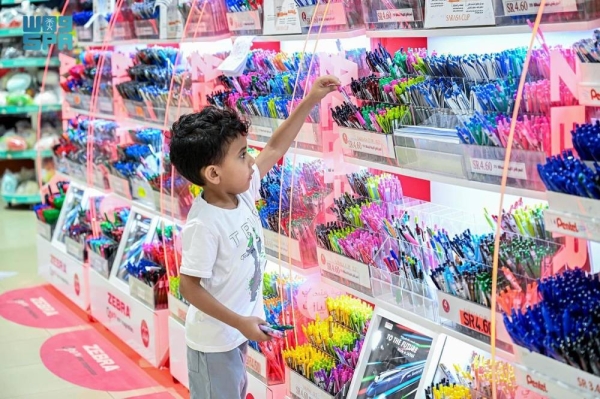
Cheaper prices for food and domestic products coupled with lower health care costs have been cited as the main reasons for the sudden influx of Lebanese into Syria
BEIRUT: Officials in Syria on Monday reported a surge in the number of Lebanese citizens crossing into the war-torn country for supplies, and new year celebrations.
Of the 26,500 people who passed through border controls on Dec. 30 and 31, at least 11,000 of them were Lebanese, Al-Watan newspaper quoted a Syrian source as saying.
Since the start of the conflict in Syria, Lebanese visitor numbers to the country have dropped significantly, with the majority of those entering being Syrian workers, merchants, foreign relief workers and diplomats.
However, a customs official at the Al-Masnaa border post with Syria told Arab News: “The movement of Lebanese entering Syrian territories on Dec. 30 and 31 was very active … Talking about 11,000 Lebanese is very reasonable and perhaps the number is greater than that.
“We have not seen such a movement (of Lebanese citizens) since the beginning of the war in Syria. (The movement was) mostly confined to the Syrians.”
Cheaper prices for food and domestic products coupled with lower health care costs have been cited as the main reasons for the sudden influx of Lebanese into Syria.
Due to the economic crisis in Lebanon, hard-pressed citizens have been returning to Syrian markets to stock up on home supplies.
Khaled Al-Husseini, who owns a communications store in Chtoura near to Al-Masnaa crossing, said that $100 was equivalent to 85,000 Syrian pounds, which could buy a month’s supply of food items such as sugar, rice, pasta, grains and other consumables, including cleaning materials, in Syria.
Meat was also cheaper in Syria than Lebanon, he added, with the price of a kilogram of lamb in Syria being 19,000 Lebanese pounds ($12.58) compared to 30,000 Lebanese pounds in Lebanon. This was “after its price increased due to the liquidity crisis and the high dollar exchange rate in Lebanon,” said Al-Husseini.
He noted that there were many reasons for Lebanese crossing the border into Syria.
“It may be for a visit to a religious place and to buy home supplies, clothes and shoes at the same time because these things are cheaper in Syria than Lebanon, especially sports shoes. Some visitors go to Syria for medical care because the costs there are cheaper than Lebanon.”
A money changer at an exchange located on a road leading to the border at Al-Masnaa, said business was brisk.
“There are some Lebanese people who enter the free market at the Lebanese-Syrian border point to buy cigarettes and tobacco because it is cheaper than Lebanon, and they pay in hard (foreign) currency.
“And there are those who take dollars with them to Syria, and most of them are families of members of Hezbollah who get paid in dollars.”
One resident of a town near the Syrian border, said: “There were people, especially the younger generation, who spent New Year’s Eve in Syria, and they told me that the evening was very enjoyable and cheaper than in Lebanon.”
It takes less than one-and-a-half hours to drive between the capital cities of Beirut and Damascus with travel times even less from central Bekaa to Damascus where many Lebanese saw in 2020.
The customs official pointed out that restrictions applied to Lebanese citizens on the quantity of food and other items they could take out of Syria. This was limited to an estimate of personal needs and larger quantities meant for trade were not allowed.
A treaty signed between Lebanon and Syria allows Lebanese to reside in Syria for up to six months, while Syrians can stay in Lebanon for 15 days provided that they have hotel reservations. However, Syrians with a Lebanese sponsor have the right to stop in Lebanon for one year.
Lebanon hosts about 1 million Syrian refugees on its territory.
Their return to Syria is conditional on obtaining approval from the Syrian authorities.











